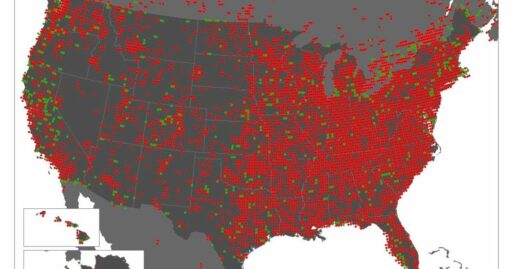As the United States continues to navigate the complex and evolving terrain of marijuana legalization, a patchwork of policies has emerged across different states. This article delves into the multifaceted aspects of the current landscape where marijuana is legally enjoyed, examining the transition from medical to recreational use, the pioneering efforts of states like New Jersey with cannabis lounges, the societal implications of increased accessibility, and the potential for federal policy reform. We explore the key developments and considerations that are shaping the way marijuana is consumed and regulated in the nation today.
Key Takeaways
- Thirty-eight states and territories have approved medical cannabis programs, signaling a shift in recognizing cannabis as a therapeutic option.
- Recreational marijuana is legal in 24 states and the District of Columbia, with federal agencies considering rescheduling to reflect its lower risk of dependence.
- New Jersey is at the forefront of establishing cannabis consumption lounges, creating a regulated social environment for legal cannabis use.
- The legalization of marijuana brings up concerns about youth accessibility and necessitates educational initiatives for prevention.
- The evolving legal status of cannabis at the state level is creating tension with federal laws, highlighting the need for potential national drug policy reform.
The Evolution of Cannabis Legalization in the United States

The Shift from Medical to Recreational Use
The transition from medical to recreational marijuana use marks a significant change in the American legal and cultural landscape. Cannabis is now legally prescribed in many states for a range of ailments, where it serves as an alternative to traditional medicines. This evolution reflects a broader acceptance of cannabis’s potential benefits and a growing recognition of individual liberties.
In the late 1990s, states began to challenge the federal stance on cannabis by decriminalizing its medical use. California led the way in 1996, setting a precedent for others to follow. By 2019, over half of the U.S. states had legalized marijuana to some extent, with a mix of medical and recreational allowances. This shift has prompted a reevaluation of cannabis’s legal status and its implications for society at large.
The legal landscape for cannabis is rapidly changing, with states taking the lead in reforming outdated policies. This not only advances the discourse on individual liberties but also highlights the tension between state and federal laws.
As the number of states embracing legalization grows, the federal government remains in a state of legal limbo regarding cannabis. This creates a complex environment for individuals and businesses navigating the conflicting laws, especially those involving firearms ownership and other federally regulated activities.
State vs. Federal: The Ongoing Legal Tension
At the core of the cannabis legalization debate is the conflict between federal and state marijuana laws. States have been increasingly decriminalizing and regulating marijuana, creating a patchwork of laws that stand in stark contrast to the federal government’s Schedule I classification of the substance. This discrepancy has led to a complex legal landscape where the actions permissible under state law may still be punishable under federal statutes.
The tension is not merely theoretical; it has practical implications for individuals and businesses operating within the state-legal marijuana industry. The federal classification of marijuana as a Schedule I drug means that activities legal at the state level could potentially result in federal criminal liability. This uncertainty extends to areas such as firearm ownership, where state laws allowing cannabis use collide with federal restrictions on gun ownership by individuals who use controlled substances.
The collective voice of states enacting policy changes reflects the will of their citizens and may prompt a reevaluation of federal laws. The recent passage of legislation in states like Maryland exemplifies the growing trend of states asserting their authority, even when it contradicts federal law.
Despite the progress at the state level, there remains a divide among lawmakers, with some advocating for state sovereignty in cannabis-related decisions, while others argue for federal oversight. The debate continues as both sides grapple with the implications of a shifting legal and social landscape.
The Role of Public Perception in Legalization Efforts
Public perception has played a pivotal role in the evolving legal status of marijuana across the United States. The shift in societal attitudes towards cannabis has been a significant driver for policy change, with a growing acceptance of its medical and recreational use influencing lawmakers and the general public alike.
- The increasing recognition of cannabis’s therapeutic benefits has contributed to its legalization for medical purposes in numerous states.
- Recreational use, once a contentious issue, is now legally enjoyed in several states, reflecting a more relaxed societal stance.
- Public advocacy and education have been instrumental in dispelling myths and stigma associated with cannabis use.
The changing public perception has not only shaped the legal landscape but has also prompted a broader conversation about drug policy reform. The dialogue continues to evolve, with the potential to redefine the national approach to cannabis and its users.
The Emergence of Cannabis Consumption Lounges

New Jersey’s Pioneering Cannabis Lounge Model
In a groundbreaking move, New Jersey has become a trailblazer in the cannabis industry by officially sanctioning the creation of cannabis consumption lounges. This initiative marks a transformative moment in the social dynamics of cannabis use, offering a regulated space for adults to enjoy marijuana products legally and socially.
The New Jersey CRC (Cannabis Regulatory Commission) has been instrumental in this development, setting the stage for a new era where cannabis is integrated into the social fabric. The lounges are more than mere establishments; they are a testament to the evolving public perception and progressive policies surrounding cannabis.
The establishment of cannabis consumption lounges in New Jersey is not just a local phenomenon but a reflection of a broader national shift towards embracing cannabis culture in everyday life.
As the concept of cannabis lounges takes root, it is reshaping the cannabis industry and the way people engage with marijuana. New Jersey’s model could potentially inspire similar initiatives across the country, influencing the future landscape of cannabis consumption and culture.
Regulatory Framework for Cannabis Lounges
The regulatory framework for cannabis lounges is a critical component in ensuring that these establishments operate within the bounds of the law, while providing a safe environment for consumers. Each lounge must comply with local jurisdiction rules, which cover aspects such as onsite consumption, designated smoking areas, and the permissible types of cannabis products.
- Lounges must be an extension of an existing retail store, not standalone entities.
- They are required to adhere to strict ventilation standards to ensure non-smokers are not affected.
- The sale and consumption of cannabis must be done in a manner that aligns with health and safety regulations.
The establishment of cannabis lounges represents a significant step in the journey of cannabis legalization, serving as a model for responsible consumption and integration into society.
Navigating the legal landscape remains complex, with each state having its own set of regulations. For instance, the New Jersey Cannabis Regulatory Commission (CRC) has set a precedent for how lounges can operate responsibly. The CRC’s approach balances public needs and safety with the demand for legal consumption spaces, marking a milestone in the industry and potentially influencing future legislation.
The Social Implications of Cannabis Lounges
Cannabis consumption lounges are emerging as pivotal spaces in the evolving landscape of social cannabis use. They represent a cultural shift, offering a communal environment where the act of consuming cannabis is both normalized and celebrated. This evolution is particularly notable in urban areas, where private consumption options may be limited, and the fast-paced lifestyle can benefit from such inclusive and relaxing spaces.
- Cannabis lounges are redefining social consumption scenes.
- They serve as a litmus test for societal integration of cannabis.
- Lounges provide a regulated, safe environment for cannabis enjoyment.
The potential for cannabis consumption lounges extends beyond mere consumption; they are becoming cultural and social hubs. With the right regulatory framework, these lounges have the capacity to balance enjoyment with responsibility, ensuring that cannabis use is both a personal preference and a collective experience.
As the concept of cannabis lounges gains traction, it’s clear that their impact on society will be multifaceted. They are not just places for relaxation and socialization but also play a crucial role in the broader acceptance and understanding of cannabis within the community.
The Impact of Legalization on Youth and Society

Concerns Regarding Increased Accessibility
The increasing availability of marijuana, particularly in states where it has been legalized, has raised concerns among health professionals and addiction specialists. The ease of access to THC (tetrahydrocannabinol), the psychoactive component of marijuana, is particularly troubling for its popularity among teens. This trend is contributing to higher consumption rates among young people, which could lead to a range of potential risks:
- Cognitive impairment and difficulties with concentration
- Mental health issues, including anxiety and depression
- Development of substance use disorders
- Physical health consequences, such as respiratory system damage and oral health problems
The normalization of marijuana use in society and its increased accessibility can have profound implications for public health, especially among the youth.
While the legal landscape continues to evolve, it is crucial to monitor the impact of these changes on younger demographics. The potential long-term health consequences are significant, not only for individuals but also for healthcare systems that may face increased burdens.
Educational Initiatives and Youth Prevention
The recognition of signs of THC use in teens is a cornerstone of educational initiatives aimed at youth prevention. Understanding these effects is crucial for educating teens and their families about the risks associated with THC use. It is essential to approach the issue with empathy and support, providing the necessary resources for informed decision-making.
Creating a supportive environment involves fostering open communication, setting clear boundaries, and providing access to educational resources and support groups. Encouraging healthy habits and involvement in recovery are key steps in promoting a lifestyle that supports well-being.
The need for mental health awareness in schools is paramount. Implementing comprehensive mental health programs and inclusive practices can mitigate the impact of stressors on teen mental health.
Educational Resources and Support Groups:
-
For Parents:
- Partnership to End Addiction (drugfree.org) offers guidance and support.
- Family Therapy and Support Groups provide a community for parents facing similar challenges.
-
For Teens:
- Alateen provides a supportive environment for young people affected by another’s substance use.
Analyzing the Societal Shifts Post-Legalization
The legalization of cannabis has ushered in a new era in societal norms and economic landscapes. Cannabis consumption lounges are at the forefront of this transformation, serving as a barometer for the integration of marijuana into mainstream culture. These establishments are not just a novelty; they represent a significant shift in public perception and policy.
- The emergence of lounges reflects a growing acceptance of cannabis use.
- Lounges act as a safe and regulated environment for consumption.
- They challenge traditional views on drug use and public spaces.
The transition from illegal to legalized status for cannabis is a journey that continues to evolve, shaping the fabric of communities and influencing legislative frameworks.
As the legal landscape adapts, so do societal attitudes. The presence of lounges is a testament to the changing tides, offering a glimpse into a future where cannabis is not only tolerated but embraced as part of the social fabric.
The Future of Federal Cannabis Policy
The Debate Over Rescheduling Cannabis
At the heart of the federal debate on marijuana rescheduling, stakeholders are weighing the implications of changing its classification. Currently, cannabis remains a Schedule I substance, indicating a high potential for abuse and no accepted medical use. This classification is at odds with the actions of numerous states that have legalized marijuana for medical and recreational purposes.
The discrepancy between federal and state laws creates a complex legal landscape, where businesses and consumers navigate a patchwork of regulations.
Critics of the proposed Senate bill argue that it may introduce more barriers than solutions, potentially restricting access to cannabis for those in need. The bill’s stringent regulations and penalties for unauthorized possession reflect a hesitance to fully embrace cannabis as a legitimate medical treatment. Meanwhile, proponents of rescheduling argue that it would acknowledge the plant’s therapeutic benefits and could lead to more research and better access.
- Discrepancy between federal and state laws
- Critics fear more hurdles for access
- Proponents advocate for acknowledgment of medical benefits
The ongoing debate is further complicated by previous legislative attempts that have failed, highlighting the division among lawmakers and the challenges of reaching a consensus on this contentious issue.
Potential Federal Legislation on the Horizon
As states continue to adapt their policies to the will of their citizens, there is a growing anticipation for federal legislation that could harmonize the national stance on cannabis. The push for federal reform is gaining momentum, with proposed bills that aim to address the discrepancies between state and federal laws.
Some key points of the proposed legislation include:
- A reevaluation of cannabis scheduling
- Provisions for banking and business operations
- Measures to ensure individual states’ rights
This skepticism is underscored by the fact that an almost identical bill, introduced two years earlier, was thwarted at the last minute by a procedural ruling.
Lawmakers remain divided on the issue, with some expressing concerns ranging from potential misuse to the belief that cannabis policy should remain a federal matter. The journey of Senate Bill 348 in Maryland exemplifies the complex interplay between state initiatives and federal oversight. As it moves to the Maryland House of Delegates, its progress will be closely watched as a bellwether for future federal legislation.
Implications for National Drug Policy Reform
As the United States grapples with the complexities of national drug policy reform, the implications of such changes are far-reaching. The potential rescheduling of cannabis could significantly alter the legal landscape, paving the way for new medical research and business opportunities. This shift would also necessitate a reevaluation of past convictions, potentially leading to the expungement of criminal records for non-violent marijuana offenses.
The debate surrounding federal cannabis policy reform is not just about the legal status of the plant, but also about the broader implications for social justice and economic development. A move towards decriminalization could lead to:
- A decrease in incarceration rates for drug-related offenses
- Increased tax revenue from regulated cannabis sales
- The creation of new jobs in the cannabis industry
- Enhanced access to cannabis for medicinal purposes
The intricate balance between federal oversight and state autonomy will continue to shape the discourse on national drug policy reform.
While the future of federal cannabis policy remains uncertain, the current momentum suggests that change is on the horizon. The implications of such reforms will undoubtedly have a ripple effect, influencing not only drug policy but also public health, criminal justice, and the economy.
Conclusion
The evolving legal landscape of marijuana in the United States reflects a significant shift in societal attitudes and governmental policies. With 38 states and territories embracing medical cannabis programs and 24 states, along with the District of Columbia, legalizing recreational use, the nation is witnessing a transformation in the way cannabis is perceived and regulated. The introduction of cannabis consumption lounges, like those recently approved in New Jersey, marks a new era of social spaces dedicated to the safe and regulated enjoyment of cannabis. However, as the legal framework continues to develop, concerns remain regarding the accessibility of marijuana to teens and young adults, and the potential implications on public health and safety. The future of cannabis consumption and its integration into society will undoubtedly be shaped by ongoing research, public discourse, and the careful navigation of the legal landscape.
Frequently Asked Questions
How many states have legalized medical cannabis programs?
Currently, 38 states and territories in the United States have approved medical cannabis programs.
Is marijuana legal on a federal level in the U.S.?
No, marijuana use is still illegal on a federal level, but it has been legalized or decriminalized in several states.
How many states have legalized marijuana for recreational use?
As of now, marijuana is legal for recreational use in 24 states and the District of Columbia.
What is a cannabis consumption lounge?
A cannabis consumption lounge is similar to a bar for alcohol but specifically for cannabis, providing a legal and social environment for consumers to enjoy marijuana.
What recent decision has New Jersey made regarding cannabis consumption lounges?
New Jersey’s Cannabis Regulatory Commission has allowed the establishment of cannabis consumption lounges, marking a significant shift in the state’s cannabis policy.
What are the concerns regarding increased accessibility of marijuana to teens and young adults?
Experts have concerns that making marijuana more accessible may impact young people, particularly in the areas of addiction and psychological health.





